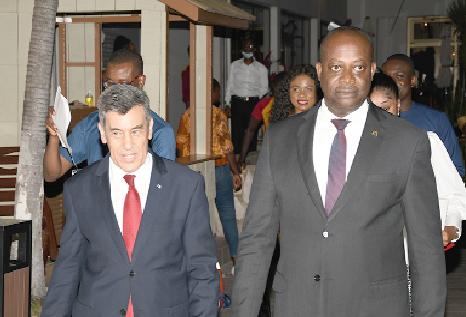
Algeria has said that it is willing to explore all opportunities to give its relations with Ghana, a substantial economic content, especially in terms of trade and investment.
It said it was hopeful that such a relation would help to address the major challenges of food security, energy transition, and climate change and adaptation.
The Algerian Ambassador to Ghana, Ali Redjel, who addressed the 68th National Day of Algeria in Accra last Friday, said with its enormous economic potentials and wide-ranging development plans, Ghana was poised to become a hub on the road to African economic integration.
He said for its part, Algeria – driven by the objectives of the African agenda 2063 — had resolutely committed itself to key projects with African countries in the fields of energy, transport, telecommunication and the diversification of trade, with the ultimate goal of making the integration of Africa effective.
“I would like to mention, for example, the realisation of the 4,000-kilometre long trans-Saharan gas pipeline mega project which will link Nigeria, Niger, Algeria and Europe, and the strategic fibre optic project connecting Nigeria, Algeria, Niger, Mauritania and Chad. The latter project, which aims at developing the regional digital economy, constitutes a tangible model of successful and fruitful partnership,” he said.
Mr Redjel said at the regional level, Algeria and Ghana shared the same vision on the future of Africa and played a leading role in consolidating security and stability in their respective regions, especially in the Sahel which faced the threat of destabilisation by terrorists groups and international organised crime, by encouraging African resolutions to African conflicts through peaceful means and in the exclusive interests of the African people.
“My country is delighted over the consultation with Ghana as a member of the United Nations Security Council and the African Union Peace and Security Council with a view to consolidating stability and security in Africa through the promotion of dialogue in the settlement of conflicts without any external interference,” he said.
Mr Redjel expressed Algeria’s gratitude to Ghana’s first President, Dr Kwame Nkrumah, for his commitment to the Algerian struggle for independence and for making Ghana, the first country in sub-Saharan Africa to welcome famous writer and activist, Frantz Fanon, as ambassador of the provisional government of Algeria in 1958.
A Deputy Minister of Foreign Affairs, Thomas Mbomba, commended Algerians for the resilience and the determination with which they fought for independence and for going ahead to build their country into a peaceful, progressive and prosperous country working to continuously improve the lives of its people.
He also commended the North African State for its continued contribution to the socio-economic development and transformation of Africa through various infrastructural projects.
Bilateral relations
On the bilateral relations between the two countries, Mr Mbomba said it had remained strong and fruitful over the years and had been characterised by cooperation in various fields, including education and scholarship for Ghanaian students, defence and security cooperation.
“We look forward to our two countries expanding the scope of our cooperation, as well as exploring new areas of cooperation for our mutual benefit,” he said.
Mr Mbomba said Algeria and Ghana could work together to improve trade relations by taking advantage of the provisions under the African Continental Free.
Trade Area
He invited Algerian investors to partner their Ghanaian counterparts to launch into the African market and explore possibilities of joint ventures and other business partnerships to help to build Africa’s economy.
Algeria’s National Day
November 1 each year is celebrated by Algerians as their National Day.
Source: graphic.com.gh











